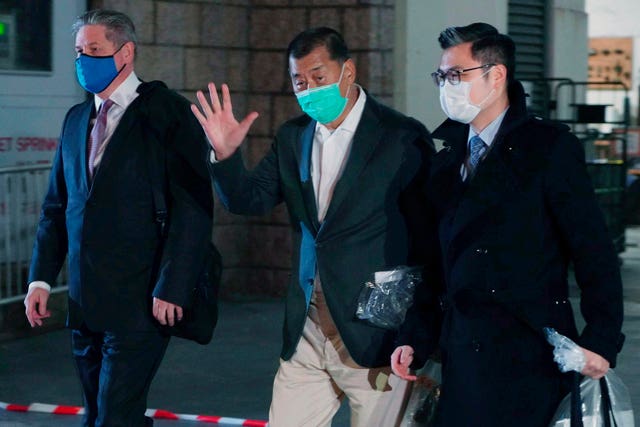Hong Kong lawmakers have passed an amendment to a law granting the city’s leader the power to bar overseas lawyers from handling national security cases, following a high-profile row sparked by a pro-democracy Hong Kong publisher’s hiring of a British lawyer.
The changes will require overseas lawyers who do not generally practice in Hong Kong to obtain permission from the chief executive before submitting applications to represent clients in national security cases in court.
The city’s leader will only give approval if there are sufficient grounds to believe the lawyers’ involvement will not contradict the interests of national security, and the decision cannot be challenged.
The Bill was passed by a majority in the city’s legislature, filled with mostly Beijing loyalists, with little opposition through a show-of-hands vote.

The legal changes were proposed this year after the city’s top court approved jailed pro-democracy publisher Jimmy Lai’s appointment of London-based lawyer Timothy Owen to represent him as he faces collusion charges under a Beijing-imposed national security law.
Hong Kong, a former British colony that returned to China in 1997, uses the same common law jurisdiction as the UK, and lawyers from other common law jurisdictions can generally work within the city’s legal system when their expertise is needed.
Hours after Hong Kong’s top court approved Lai’s choice of lawyer in November, city leader John Lee asked Beijing to decide whether foreign lawyers should be allowed to work on national security cases.
While China’s top legislative body did not directly rule on whether these lawyers could handle such cases, it said the city’s leader and committee for safeguarding national security had the power to decide the matter.
The mechanism would apply to both criminal and civil cases related to national security, it said.
Speaking on Wednesday, secretary for justice Paul Lam defended the changes by arguing defendants could choose representation from more than 1,600 barristers in Hong Kong.
But in practice, defendants in national security cases are left with a small pool of lawyers who can handle such cases, Kevin Yam, senior fellow at Georgetown Centre for Asian Law, said.
“Pretty much almost all the barristers who are willing and able” to take up such cases are already handling an ongoing trial involving 47 activists who were charged under a national security law over an unofficial primary election, Mr Yam said. That trial is expected to last 90 days.
He also noted that the definition of national security was vague, so it would be hard to determine when foreign lawyers would be turned away under the new mechanism.
“If you are a foreign lawyer … would you take the risks in going through the whole uncertainty about whether the case you’re going to take is going to involve national security elements?” he said.
The legal changes passed on Wednesday were not retrospective.
Lai’s lawyers earlier learned that the committee for safeguarding national security had decided Mr Owen’s representation of him would be likely to pose national security risks and advised the director of immigration to refuse any new work visa applications from Mr Owen related to the case. The director of immigration said his department would act in accordance with that advice.
Last month, the lawyers filed an application for judicial review, asking the court to quash the committee and director’s decisions. The court is expected to hand down a decision later.






